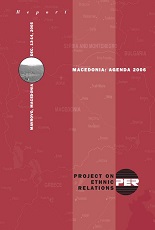Macedonia: Agenda 2006
Macedonia: Agenda 2006
Author(s): Livia Plaks
Subject(s): Governance, International relations/trade, Inter-Ethnic Relations, EU-Legislation
Published by: PER Project on Ethnic Relations
Keywords: Mavrovo process; Ohrid agreement; Macedonia EU candidacy;
Summary/Abstract: The December 2005 Mavrovo roundtable came at a historic moment for Macedonia. Having received a positive evaluation on Macedonia from the European Commission in November, the EU’s Council of Ministers was set to grant the country EU candidate status—a major milestone for a state still dealing with the consequences of a violent ethnic conflict in 2001. However, on December 12, the day before the beginning of the Mavrovo talks, the news from Brussels was that the Council, troubled by such setbacks as the recent French and Dutch popular rejection of a new European constitution and the continuing stalemate in budget negotiations, might vote to delay a decision on Macedonia’s candidacy until the next EU Presidency. This potential uncertainty over the country’s EU prospects sent shockwaves through Macedonia’s political scene.
While the potential for a delay in Macedonia’s EU candidacy dominated much of the discussion at Mavrovo, other questions, such as the upcoming 2006 parliamentary elections and the implementation of certain reforms related to the Ohrid Framework Agreement, were also significant topics of discussion. Even these issues were seen by many participants as highly connected to the developments in Brussels, however, and Macedonia’s EU candidacy returned time and again in the discussions as the dominant outside factor shaping the country’s immediate future.
This Mavrovo roundtable, the sixth since the series began in 2003, was characterized by a high degree of consensus. No participant disputed that European integration should be one of the state’s top priorities; to the contrary, some opposition leaders claimed that their parties, rather than the current government, should in fact be credited with paving the way to the country’s expected EU candidacy. The question of election irregularities was also an important agenda item on which there was broad agreement, with many participants supporting tougher penalties for violators, as well as reforms to the election law and the makeup of the election commission to improve the quality of the campaigns and the voting process itself.
Series: PER Reports
- Page Count: 18
- Publication Year: 2005
- Language: English
- Content File-PDF

